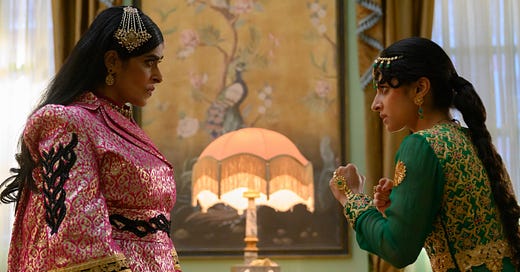Indy Film Fest: Polite Society
Director Nida Manzoor brings to life a heartwarming and hilarious coming of age story that celebrates the messy adventures of following your dreams, sisterly affection, and friendship.
While watching “Polite Society” I couldn’t help but be reminded of why I have always enjoyed independent films so much. Though the premise of this film is one we have seen time and time again in coming of age stories, this one superbly exemplifies the importance of allowing screenwriters and filmmakers to maintain their creative integrity.
This becomes more apparent as we follow the story of teenager Ria Kahn, played by Priya Kansara, an aspiring stunt woman attempting to navigate the impending changes in her life and the challenges of following her dreams. Priya Kansara gives a fantastic performance here that is both hilarious and compelling. Her ability to really lean into the inevitable awkwardness that accompanies the attempts to assert autonomy as a teenager, while caught between burgeoning independence and reliance on ones family is key to what makes the film’s fun and wacky execution so convincing.
The trouble for Ria begins after her sister, and biggest supporter, Lena drops out of art school and begins dating the rich and successful doctor Salim, who their parents believe to be the perfect solution to Lena’s currently directionless life. Naturally this worries Ria, who begins struggling to reconcile the possible consequences of her parents disappointment in her own goals, with the upcoming loss of her sister after her marriage and move to Singapore.
One of the most notable highlights of “Polite Society” are the spectacular performances given by Ella Bruccoleri and Seraphina Beh, playing Clara and Alba, Ria’s best friends. These two hilarious ladies act as counterparts to Ria’s antics and assist her as she plots to sabotage her sister’s fast approaching marriage to Salim whom she, seemingly, inexplicably distrusts.
While following the various shenanigans that ensue as this ragtag group of adolescents attempt to derail the wedding through half baked schemes, one of the films primary strengths begins to emerge. The dialogue. Frequently quippy, full of wit, and fast paced, the dialogue in this film is both strikingly original in its take on a familiar writing style, and entertaining as it provides a sense of cohesion often missing from others of its kind.
Although this type of dialogue isn’t necessarily revolutionary, for example Amy Sherman Palladino’s early 2000’s television show Gilmore Girls also employs a similar style of writing, Nida Monzoor does an excellent job balancing sarcasm with over the top reactions. Most notably, the consistently witty dialogue never overshadows the narrative in a way that cheapens the heartfelt themes at it’s core.
Additionally, the editing and cinematography of “Polite Society” is a key aspect of this independent film that works well in tandem with the exceptional dialogue to its overall cohesion. Throughout the film there are a plethora of skillfully done editing decisions and fast paced action scenes that exemplify this. Furthermore these choices perfectly execute a delicate balance between campy fighting sequences, that pay homage to other genres, without compromising the narrative’s integrity. This is no doubt one of the reasons behind why “Polite Society” works so well.
These thoughtful and carefully executed ideas underscore the cohesion of the storyline as a whole. But, it is the excellent performances given by the entire cast hold the film together and allows the underlying authenticity of the script that lets the heart of “Polite Society” to come through in a major way. Many character driven movies have casts that work well together and play off one another, but the cast of “Polite Society” is perhaps one of the best examples of full cast chemistry that I have seen in a long time. Not only do the actors commit to the over the top nature of the film’s aesthetic, but do so in a way that accentuates each of their characters individuality.
I was thoroughly and pleasantly surprised by how much I enjoyed “Polite Society”. I was entirely sold within the first fifteen minutes. Everything from the soundtrack, to the infrequently used chapter titles breaking up each section of the plot, to Ria’s dedication not only to her own dreams, but her sister’s as well, introduces a new take on the ideas of rebelliousness and individuality in the coming of age story genre. Ria’s tumultuous journey to save her sister, though at times misguided, is not only relatable, but successfully communicates how having someones best interest at heart can often be misunderstood.





